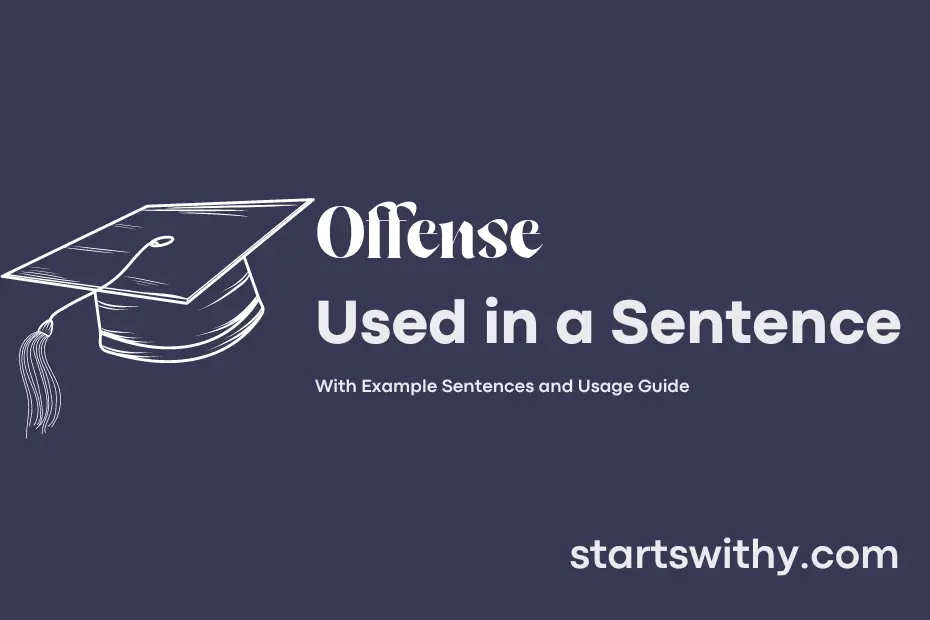Offense, in its simplest form, refers to a breach of a law or rule that results in wrongdoing or harm. It can encompass a wide range of actions that are considered unacceptable or inappropriate within a particular context, often leading to consequences or penalties for the individual responsible.
Whether it involves violating a social norm, breaking a legal statute, or engaging in behavior that goes against ethical standards, offenses can vary in severity and impact. Understanding the concept of offense is crucial in promoting a safe and harmonious society, as it helps establish boundaries and expectations for acceptable conduct.
7 Examples Of Offense Used In a Sentence For Kids
- Offense means hurting someone’s feelings.
- It’s not nice to do things that can cause offense to others.
- We should always try to speak kindly so we don’t give offense.
- If we feel someone has taken offense, we should apologize.
- It’s important to think before we speak to avoid offense.
- We should treat others with respect and avoid causing offense.
- When someone apologizes for giving offense, we should forgive them.
14 Sentences with Offense Examples
- Offense can sometimes be taken by fellow classmates when their ideas are challenged during a debate.
- It is important to be cautious of cultural differences to avoid unintentionally causing offense while interacting with international students.
- Plagiarism is a serious academic offense and can lead to severe consequences, including expulsion from the college.
- Students should be mindful of their language and actions on social media platforms to prevent causing offense to others.
- Violating the college’s dress code may be seen as an offense and could result in disciplinary action.
- Offense can be caused if group project members do not contribute equally or fail to meet deadlines.
- Using derogatory language towards classmates can lead to hurt feelings and deep offense within the college community.
- During sports competitions, it is crucial for players to follow the rules to avoid committing an offense that may impact the team’s standing.
- Not citing sources properly in research papers can be considered an offense and result in a lower grade.
- It is important to be respectful while engaging in discussions to avoid causing offense to those with differing opinions.
- Overcrowding in libraries or study areas can be seen as an offense to other students trying to focus on their work.
- Tardiness to class can be viewed as an offense to the professor and disrupt the learning environment for other students.
- Offense may be taken if a student is caught cheating on exams or assignments, resulting in academic penalties.
- Making jokes that target certain groups based on gender, ethnicity, or religion can lead to severe offense within the college campus.
How To Use Offense in Sentences?
To use Offense in a sentence, start by identifying a situation where you want to convey a sense of wrongdoing or displeasure.
Next, choose the noun form of the word “offense” to refer to a violation or transgression. For example, you can say, “His behavior was an offense to our community standards.”
Alternatively, you can use the term “offense” in a sporting context to refer to the team that is trying to score points. In this case, you can construct a sentence like, “The team’s strong offense helped them win the game.”
You can also use the word “offense” in a legal context to refer to a crime or a violation of the law. For instance, you can say, “The suspect was charged with a serious offense.”
Remember to always make sure that the sentence context fits the meaning of offense that you intend to use. Pay attention to the plural form “offenses” if referring to multiple violations. With practice, you will become more comfortable incorporating offense into your everyday language.
Conclusion
In summary, the variety of sentences using the word “offense” illustrates its diverse applications in expressing wrongdoing, both in legal contexts and everyday conversations. Whether discussing a criminal act, a personal slight, or a breach of social norms, “offense” serves to denote a transgression or violation that may cause harm, upset, or disturbance to others. These examples highlight the word’s flexibility in articulating breaches of conduct, ranging from minor infractions to serious crimes.
Overall, the sentences featuring “offense” showcase its significance as a term that captures the essence of wrongdoing and the need for accountability. By understanding the nuances of its usage, we can effectively communicate instances of offense and promote a culture of respect and ethical behavior in various settings.



